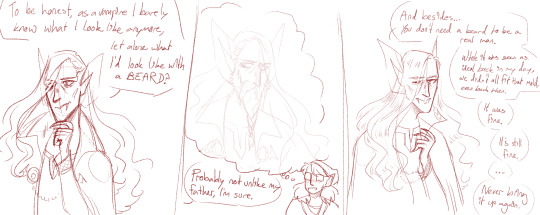#einarr just doesn't like the question
Explore tagged Tumblr posts
Note
If you don’t mind, I saw the comic about vampire hair and it made me wonder what would Einarr look like with a beard?
the context

he'd rather not dwell on it too much
#asks🦇#low stakes 🦇#sometimes i wanna start an oc ask blog#this is probably like. the third time someone has been like 'but what would einarr look like with a beard tho' so ALRIGHT FINE i drew it#the answer is viking. he'd look more like the usual bearded viking stereotype. he'd also look just like his dad who matches said stereotype#also rune is just really gay for him either way#however einarr is very aroace and does not return those feelings at all and honestly sees rune more like a child. sorry rune#also don't worry i'm not mad at you for asking#einarr just doesn't like the question#the gender standards he grew up with are different from ours and over the centuries he has been kinda unraveling it. unpacking it all#deciding that gender norms are dumb; they FLUCTUATE anyway and what's masculine in one century can be horrendously outdated in the next#he has also mostly accepted his fate anyway#it is what it is#and as such; he should be allowed to do whatever he wants. like wearing those feminine brooches bc he likes the look of em#he isnt bothering with the absolute project that is growing a beard as a vampire when it can fall off just as easily as when his hair reset#when it means he has to avoid all sorts of shifting. no bat forms. no mistshifting. none of this. all while remaining as calm as possible#and he has done it before! once. it did not make it to the length that rune is imagining sadly#i'm rambling#it's a complex topic#he has mixed feelings about it#and honestly i just find that more interesting
8 notes
·
View notes
Note
Question regarding Freya. In one or two sections of the Prose Edda, she's referred to by a name that might mean "sea-brightener" or "the one who makes the sea swell". I was just wondering what the context for these are?
One of Freyja's names is Mardǫll. The meaning of the name is not actually known, and it's never explained in Old Icelandic literature other than Snorri telling us that this is the case. It occurs a bunch of times in Skaldic poetry, always with a connection to describing gold:
Ýtti ǫrr hilmir [...] tôrum Mardallar 'The generous prince distributed [...] Mardǫll's tears [=gold]' (Bjarkamál in fornu 5)
Mardallar var glysligr grátr 'Mardǫll's tears were glittering [=gold]' (Málsháttakvæði 8)
Nú hefr bekkjar tré bliknat brátt Mardallar gráti 'Now the tree of the bench [= 'woman'] quickly gone pale with Mardǫll's tears [=gold]' (loose verse by Saint Ólafr)
Þars Mardallar milli [...] liggr skurða [...] grátr 'There where Mardǫll's tears lie between the grooves' (Øxarflokkr 1 by Einarr Skúlason; this poem is about an axe which was inlaid with gold)
This last poem, which can be found in its entirety with translation and annotation here, is probably the single source that Snorri gets most of his information about Freyja from. It confirms that, at least in the mythological system that Einarr had for working kennings from, Freyja and Mardǫll refer to the same person, and many details about her family. One has to wonder, if Einarr hadn't been given an axe fancy enough to write a poem about it, would we know even less about Freyja? It also goes to show how much of "Norse Mythology" that we still have was selected for preservation based entirely on the social obligations of poets in an elite, aristocratic context.
Anyway, like I said the meaning of Mardǫll is not actually known, but the most common theory is that the -dǫll part is the same as the dell- in Dellingr and the -dallr in Heimdallr, and that this is related to Old English deall meaning 'bright.' This is far from certain, but is one of the better theories proposed. The first component, mar-, does mean 'sea' although technically on the face of it it could also mean 'horse' or even something else.
I don't know where the 'swell' theory comes from. Simek says it comes from reading Mardǫll as Marþǫll, which is reasonable and it's even written that way a few times in Old Icelandic texts but he doesn't explain what word that meaning is derived from. A þǫll is a fir tree (and indeed in Modern Icelandic a marþöll is a kind of evergreen tree). Apparently the word mardöll would also refer to a mermaid or similar in folklore later on.
However, all of this should be considered alongside the skaldic custom of referring to gold as '[fire] of [water]' or otherwise being contained in water. See the list of kennings for gold here; very many of them refer to gold as something that illuminates water: https://skaldic.org/m.php?p=kenning&i=134
I think that with this in mind it is reasonable to guess that Mardǫll does refer to illumination of/in the sea and that this is itself a reference to gold, and that's why that name in particular is so often invoked in association with describing gold in skaldic poetry.
92 notes
·
View notes